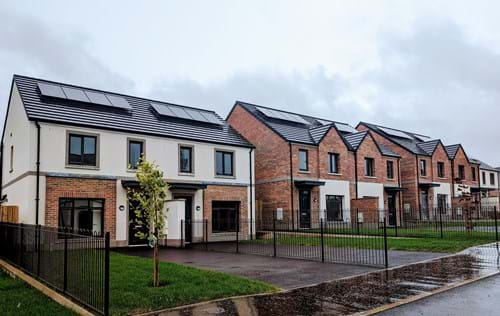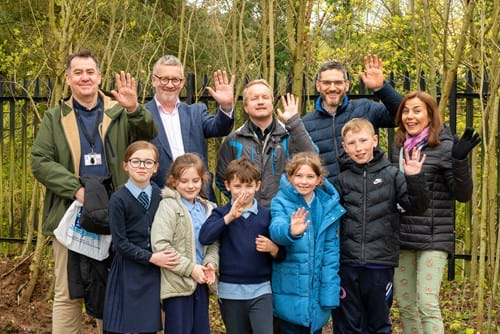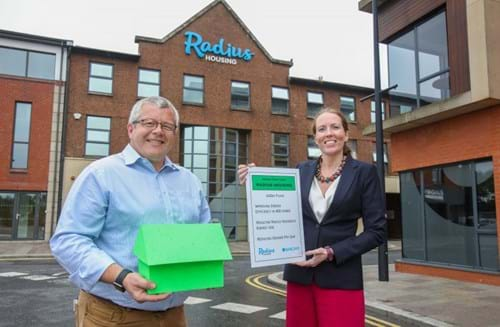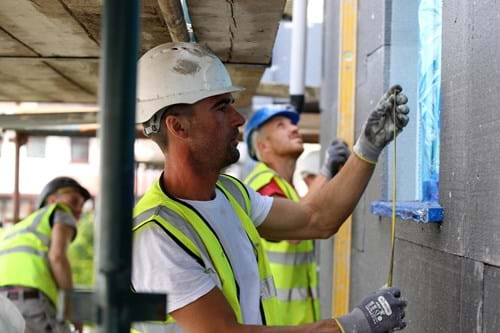All-Ireland Housing Awards 2025
Read all the shortlisted entries into this award category, striving for sustainability, at the All-Ireland Housing Awards (AIHA) 2025 and find out who won the award on the night.
This award celebrates organisations that are progressing successfully to achieve their sustainability goals. By recognising efforts like striving closer for net zero targets, adopting renewable energy, and practicing sustainable asset management, this award highlights the importance of environmental responsibility and social impact.
This award was sponsored by Department for Communities.
Winning project name
Improving warmth and wellbeing at Cardy Rock Court
Winning organisation
Co-operative Housing Ireland
Statement of support
In 2022, Co-operative Housing Ireland (CHI) implemented an “Improving Warmth and Wellbeing” programme with the objective of upgrading 200 of our poorest energy performing homes to a Building Energy Rating (BER) of two. As well as improving energy efficiency, retrofits help promote a healthy internal environment, as cold homes promote damp and mould which can cause or aggravate respiratory diseases and have a negative impact on mental health and wellbeing. As a housing provider, it was key for CHI to invest in these upgrades to assist with the health and wellbeing of our communities.
The programme was also rolled out as part of our commitment to the government’s Climate Action Plan which outlines actionable steps to reduce greenhouse gas emissions by 51 per cent by 2030.
Our ‘Improving Warmth and Wellbeing’ retrofit programme spans several CHI estates and developments and aims to see energy upgrades to over 200 homes completed. The programme was carried out in a phased approach and our most current phase is being delivered to 45 homes in Cardy Rock, Balbriggan and will be completed in February 2025.

The Cardy Rock development was launched in 2,000 with most residents living there for over 20 years. Cardy Rock was identified by CHI’s asset management team as a development that required retrofitting. Prior to commencing the retrofit the average BER on the estate was C3.
To commence the upgrade, CHI engaged project management team Kingdom Installation ltd. Kingdom Installation has been CHI’s partner on previous retrofit projects and is mandated by Sustainable Energy Authority of Ireland (SEAI) as a one-stop shop for the delivery of retrofit projects.
Kingdom Installation’s first step when preparing to retrofit a development is to verify the current BER rating of the property. Using specialised software, they then model the potential energy improvement for each retrofit action.

At Cardy Rock, the energy upgrades included:
- Replacing original windows with triple-glazed windows 1.1 W/m²k
- Replacing back doors with double-glazed uPVC doors with a 1.4 W/m²k and air leakage factor (L factor) 0.03 W/m²k
- Installing air-to-water heat pumps in every home
- Installing high output low temperature radiators and power showers
- Removing existing gas boilers.
Once the works are fully complete, Kingdom Installation expect to achieve a BER A2 rating average across the estate. On completion SEAI assessors will also inspect a sample of the work that Kingdom Installation homes upgraded.
Involving member tenants
The work is being carried out with minimal disruption to member tenants and clear communication is maintained with members. Each household received a letter and flyer outlining the procedure, the benefits, and their responsibility ahead of the upgrades. Members were also encouraged to approach CHI and Kingdom with queries before and during the project. An in-person kick-off meeting was also held with members to answer queries and discuss the timelines and scope of the project. All member tenants will be able to remain in their homes whilst work is being carried out.
Once a home is completed, Kingdom Installation provides a comprehensive service to members which covers everything from information packages to live demonstrations. Members are given individual induction(s) on new technologies installed. Workshops are held with CHI staff, community ‘energy champions’ and contractors. Furthermore, members have access to advice and support from Kingdom and contractors at any time if required.
Outcomes and achievements
- CHI’s primary responsibility is to our members, so the biggest benefit from retrofitting homes is ensuring the warmth and wellbeing of members, which also benefits them in terms of their reducing their cost of living.
- Upgrading CHI homes to minimum BER B2 has many benefits including savings spent on fuel, and raising member tenant’s standard of living.
- Retro-fit payoffs include:
- Members:
- Estimated up to 40 per cent saving per home per year
- Reduced energy demand
- Reduced carbon emissions
- Greater level of comfort.
- AHB:
- Reduction of almost 50 per cent in repairs and maintenance calls relating to heating, after initial bedding in period.
- Members:
Member tenant
“We’re so lucky to get all the work that we’re getting done. It will make a huge difference for the energy efficiency and heating. We can already see the difference. We got the front door done last night and they’re doing the patio doors today.”
Shortlisted entries
Choice Housing - How Choice is responding to the sustainability challenge
Application entry
- Project name: How Choice is responding to the sustainability challenge
- Lead organisation: Choice Housing
Statement of support
Choice have a long history of taking action to manage energy consumption, address sustainability and support their tenants. Key to this was the development of a dedicated sustainability and energy team comprising of four members. Choice’s investment in this area demonstrates that they are acutely aware of the sustainability challenge and are leading the sector to successfully achieve their sustainability goals.
Choice’s three year Sustainability and Energy Strategy outlines their ambition to be net zero by 2050, aligned with UN Sustainable Development Targets. Their new Sustainability and Energy Strategy from 2025 will build on success to date, seeking to address areas where further work is required, including a carbon baseline, alignment with local government targets, decarbonisation of heat and reduction of supply chain emissions.
Steps taken to make Choice more sustainable include:
Improving the energy efficiency of existing homes
Choice identified a target of reducing their number of Energy Performance Certificate (EPC) Band D-G properties, focusing particularly on those within Bands E-G. In 2022, they only had around 215 properties in these bands and, through targeted improvements and data accuracy, this number has been reduced to just 52 homes (with 48 Band E, 4 Band F and 0 Band G properties). This represents approximately 0.5 per cent of their properties. Choice have also increased their average EPC energy efficiency rating to 76.7, significantly higher than the Northern Ireland average, and have obtained EPC data for almost 95 per cent of their homes (with around four per cent modelled). Choice have also progressed their deep retrofit of two pilot properties, aligned with the PAS2035 process, with these projects to complete early in 2025.

Reviewing design requirements for new homes
Choice have reviewed their design requirements for new homes, emphasising their ambition to achieve SAP Band A on new homes, subject to value for money. A blueprint for design has been created and is now part of our design guide. Choice continue to engage with their developers to improve standards and deliver positive outcomes for their tenants.
Investing in renewable technologies
Choice have invested in renewable energy over the last 15 years and further recent investment in Solar PV systems means they now have a portfolio of around 450 systems across the country. Batteries are also currently being considered as part of a trial, alongside new landlord solar PV systems. This initiative is part of their target to invest around £250,000 in innovation, which has included online energy management portals, an electric vehicle trial, remote heating controls and remote solar PV meters. Choice also invested in the ‘Samsara’ system to help monitor and report on fuel costs, driver efficiency and emissions of their fleet.
Managing landlord energy consumption
In 2024, Choice procured landlord electricity and natural gas in order to deliver value for money and appropriately manage costs which are passed on to tenants, with landlord energy costs exceeding £2 million/annum. This follows the recent investment in an online energy management system and ongoing validation of energy bills. By taking action to reduce energy consumption, Choice have reduced scope 1 and 2 emissions by 17.6 per cent from 2020/21.
Protecting biodiversity loss and enhancing the environment
Choice have taken significant action to address the biodiversity crisis including holding their first biodiversity week, launching staff and tenant competitions, publishing a biodiversity leaflet, progressing two specific biodiversity projects and working with their grounds maintenance contractor to embed biodiversity improvements as part of annual works. Choice worked with partners including Ulster Wildlife to update requirements for our new developments, and RSPB, to engage with local communities. Choice also recently planted 150 native trees in Ballymena, engaging local residents and working with partner organisations.
Outcomes and achievements
Tenants have benefitted from the sustainability actions Choice have taken through:
- Financial savings - landlord energy procurement and management delivers financial savings to tenants through service charges and heating charges. Savings are anticipated to have exceeded £10,000.
- Reduced energy costs - by taking action to improve EPCs and continued investment in renewable technologies, tenants will have reduced energy costs and improved comfort alongside other potential benefits, such as the reduced likelihood of damp and condensation issues, and health benefits.
- The portfolio of 450 solar PV systems is estimated to generate over 500,000kWh of renewable electricity over the next year, with savings to tenants estimated to be over £60,000 last year.
- Tenant engagement and empowerment – Choice supported Northern Ireland’s Energy Week in November 2024 with daily articles and social media posts, reaching 5,248 residents and stakeholders. The sustainability and energy team visited a scheme and engaged with tenants on opportunities to ‘switch and save’, with one tenant able to save over £70 on her electricity costs as well as visits to a number of other schemes to support tenants in using their heating systems, to improve comfort and reduce costs.
Woven Housing Association - Journey to Net Zero
Application entry
- Project name: Journey to Net Zero
- Lead organisation: Woven Housing Association
Statement of support
Woven Housing Association has been actively responding to the net zero challenge since 2021. Launching their Environmental and Sustainability Strategy (ESS) (2022-25), they engaged with a range of stakeholders who were invited to take part in a live discussion panel with some local sustainability experts. Woven adopted this format to be transparent about their goals and commitments. They are now working on their “Journey to Net Zero Strategy” to take over from the ESS.
From the beginning, Woven has been working through their commitments with their tenants placed front and centre for example Woven detailed that they would invest in greenspace to support their tenants’ efforts to lower their carbon footprint, and they have done just that with new greenspaces, raised beds, and native flowers growing across our schemes.

Woven has also undertaken projects to map, record, and report on their organisational carbon footprint. They have:
- Appointed a 100 per cent redirected waste contractor
- Centralised their in-office waste disposal
- Switched to 100 per cent renewable electricity in all their offices
- Introduced blended working and business travel policies
- Delivered the first Northern Ireland wide social housing sustainability networking event
- Invested in resources and staff to undertake all the above and many more projects.
Woven has invested in greenspace development to begin the work of offsetting their carbon footprint. For example Woven created a greenspace at Springbank in West Belfast which was developed to enable local primary schools, community groups and their tenants to access this space for varied community activities. This space has also been earmarked as their first recorded carbon sink, with the trees, soil, and grass all working hard to reduce Woven’s carbon footprint.
Following the success of Springbank, Woven has set their sights on a larger greenspace development next year at their Linen Mill Court scheme. They plan on enhancing the already established carbon sink habitat, through the inclusion of a pioneer and intermediate habitat to complement the existing climax habitat already present.
Woven has also been working in collaboration with Lagan Regional Park, Formation Works and Friends of Callan River to plant 80 trees in a greenspace situated adjacent to the River Lagan and their main offices at Laganwood House.
In addition, their work has highlighted Woven as a source of good practice, and they have recently been approached by CIH to take part in a case study exercise. Woven will be one of four organisations representing the whole of the United Kingdom and the only representative from Northern Ireland. Woven accepted this invite with the same spirit and openness they displayed when hosting Northern Ireland’s first social housing sustainability networking event, where they shared their successes and failures to build a level of trust with their counterparts across the province.
Woven feel that working in silos when it comes to climate action ties a hand behind their back. While they are not the largest housing association in Northern Ireland, Woven feel that their innovative approach to collaboration on this subject has created a platform for others, large and small, to air their views and share knowledge and understanding.
Outcomes and achievements
Woven hope to build on previous years successes regarding both built and land assets. They plan to have a second networking event early in 2025 to reconnect with all their housing colleagues across Northern Ireland while sharing updates on their progress to encourage other organisations to do the same. Woven believe in transparency and openness when it comes to the net zero journey. If they can support their employees, tenants and suppliers to move forward with their climate journey, this can only benefit everyone within society who will physically and mentally benefit from a cleaner, less polluted environment.
Radius Housing Association - The Radius Sustainable Way
Application entry
- Project name: The Radius Sustainable Way
- Lead organisation: Radius Housing Association
Statement of support
Radius Housing is committed to creating inclusive, vibrant and sustainable communities across Northern Ireland by embedding environmental, social, and governance (ESG) principles into every aspect of our operations. As part of this commitment, our strategies focus on addressing the climate crisis while enhancing the physical and financial wellbeing of our tenants and fostering ecological stewardship.
In 2023, Radius Housing published its second ESG strategy, setting out clear goals to improve our environmental, social, and governance impact. A central component of this strategy is the actions we can take to become more sustainable and play an active role in tackling climate change. Our approach recognises the dual benefits of sustainability: environmental responsibility and the tangible, positive impact on tenants’ lives.
By constructing and retrofitting homes to be more energy efficient, we not only reduce environmental impact but also help tenants’ lower energy bills and improve health and wellbeing.

The ESG strategy highlights two critical themes - climate change and ecology:
- Climate change: We assess how our activities impact the climate, with a focus on improving EPC ratings, reducing emissions, enhancing renewable energy capacity, and implementing robust environmental strategies.
- Ecology: We prioritise protecting the local environment through policies and practices that support sustainable material sourcing, waste management, water conservation, pollution control, and biodiversity promotion.
Central to this strategy is The Radius Sustainable Way: “By placing customers at the core of what we do, we are not only a socially responsible purpose-driven organisation but one that recognises the role our natural world plays in shaping the world we want to create, where everyone has a place.”
Radius Housing’s initiatives to promote sustainable development are underpinned by financial innovation. In partnership with Barclays, we secured a £20 million Green Term Loan as part of a broader financial agreement to support the ESG goals. This funding allows us to raise energy efficiency standards in existing homes, ensure new builds meet higher standards, and take steps to address broader social issues, such as reducing the gender pay gap.
Through this financial commitment, we aim to increase the EPC ratings of 400 homes annually while achieving year-on-year reductions in energy consumption. These efforts are part of a £50 million annual investment in both new and existing housing stock, ensuring the delivery of long-term environmental and social benefits.
Specific achievements include:
- Energy efficiency: Our focus is on retrofitting properties in the D, E, and F EPC categories to achieve a C rating or higher. This includes a £25 million investment to modernise older, less thermally efficient housing stock, eliminate dampness, and enhance tenant living conditions.
- Green energy: Over 400 PV panels have been installed across Radius properties, generating 710,000 kWh of green electricity annually, with further expansion planned.
- High-standard new builds: In 2023, 92 per cent of our new homes achieved an EPC B rating, with an average SAP rating of 81. In 2024 all new construction projects are being built to EPC A standard providing more energy and financially efficient new homes.
Radius also engages in community-driven environmental projects, including biodiversity initiatives like tree planting, re-wilding, and the creation of open green spaces. For example, we gifted a large section of land adjacent to Balloo Wetlands to Ards and North Down Council for management by the Wetlands Trust, supporting local biodiversity and sustainability education. This ensured this land would always be retained as open space benefiting the whole community.
Outcomes and achievements
Our work demonstrates that sustainability is not merely an aspiration but a tangible and impactful part of our operations.
In Ballymena we are completing construction on 135 new homes on the former St Patrick’s Barracks site, where all properties are EPC A. This high standard can be seen in other projects such as Ross Street which just completed and the Gasworks site which is under construction in Belfast.
Our sustainability efforts extend beyond housing development. The £4.4 million refurbishment of St. John’s apartment block is transforming the energy efficiency of 46 apartments, significantly reducing tenants’ energy bills. Meanwhile, our new Holywood office is being developed to BREEAM Very Good Standard, ensuring that we lead by example in our corporate facilities.
Our tenant initiatives have transformed tenant engagement and environmental outcomes, such as:
- Biodiversity boost:
- 1,800+ students and 400+ tenants participated in biodiversity projects.
- Planted trees and developed growing gardens in schools and schemes.
- Achieved four Community Green Flag Awards in 2023.
- Transfer of Balloo Wetlands to Ulster Wildlife Trust in 2024
- Sustainability in action:
- Delivered 14 strategic outcomes addressing tenant priorities like anti-social behaviour and heating solutions.
- Equipped tenants with tools and training for waste management and re-wilding efforts.
- Partnered with organisations like NI Water and Trees on the Land to ensure sustainable outcomes.
Northern Ireland Housing Executive - Energy Efficiency in Social Housing Programme
Application entry
- Project name: Energy Efficiency in Social Housing Programme
- Lead organisation: Northern Ireland Housing Executive
Statement of support
The Housing Executive’s Energy Efficiency in in Social Housing Programme has transformed the lives of 1,400 tenants across Northern Ireland by carrying out innovative improvements to their homes. What is most remarkable about this programme was that it has focussed on older dwellings, of ‘non-traditional’ construction which had very poor thermal performance.
The objective of the programme was to deliver Northern Ireland’s first scalable energy efficiency scheme to improve the external envelope of houses on a ‘fabric first’ approach. This achieved the desired outcome of reducing carbon emissions, reducing householder bills and providing healthier homes.
The work was carried out on a mix of No Fines properties and Aluminium Bungalows - across Northern Ireland. The total programme costs were £37.8 million, with eligible funding of £31.7 million (£18.3 million of ERDF funding, with the remainder being match funding by the Housing Executive).
A key programme priority was to ensure this work was scalable and could be replicated across the Housing Executive’s own social housing stock and also across other housing providers with a revitalised construction industry ready and skilled up for a larger future decarbonisation programme.

The works comprised of external wall insulation, new double glazing, new doors and other airtightness measures.
Quality standards is a key aspect of the work and to ensure this was met we applied the PAS 2030 standard for installing energy efficiency measures in existing buildings. We worked in collaboration with our contractors to assist them in obtaining the PAS 2030 standard accreditation.
The programme was delivered with six contractors across fifteen towns and cities despite significant challenges and disruptions in the construction industry in resourcing materials and operatives with the necessary skills, plus the impact of the Covid lockdown that stopped works on site for several months.
In line with the programme aims, the works not only delivered a significant improvement in the quality of life for our tenants and reduced their energy use and costs at a time at which the cost of living has been significantly increasing, but also reduced carbon emissions and the properties potential susceptibility to damp and mould.
A result of this innovative programme was the creation of a new retrofit industry in within NI, in both the construction sector and its supply chain. The project has demonstrated that a skilled workforce will be required in both the client and contractor environments as new skills and competencies were needed in the delivery of this programme.
Indeed, this programme has provided assurance to the Housing Executive to continue this programme as ‘business as usual’ to improve the health and wellbeing and reduce bills for its tenants living in ‘non-traditional’ dwellings and well as promote the lessons learned across the housing sector within NI.
Importantly the programme and the lessons learned from it have informed the Housing Executive’s Corporate Sustainable Development Strategy and Action Plan (2022-2027) Delivering Sustainable Homes and Communities, and - in conjunction with a number of other pilot projects undertaken by the organisation to test new technologies and construction techniques.
Outcomes and achievements
The project has achieved the following:
- Thermally improved 1,406 of some of the most thermally inefficient housing in NI with a new SAP average ratings of 73 (Band C)
- Estimated annual decrease in CO2 emissions by approx.1.5 tonnes per property per year, which is equivalent of 2103 tonnes per year, every year for the whole programme
- Decrease of annual energy consumption: the average primary energy savings were 7,233kWh/year/dwelling
- Post-works monitoring has indicated that there could be a £772 per annum reduction in energy costs for the tenants
- Created a new retrofit industry in NI which wasn’t previously there and is now ready for further programmes
- During the programme it was important to educate the tenants and staff of how the works would provide a positive change as well as keep key strategic stakeholders updated
- Feedback from the tenants has been extremely positive citing warmer dryer homes and lower energy bills
- A collaborate approach across departmental bodies, housing sector and the construction industry to reduce fuel poverty and carbon emissions
- Consequently, the programmes’ outcomes has informed the Housing Executive’s future development of a stock-wide thermal improvement programme.



